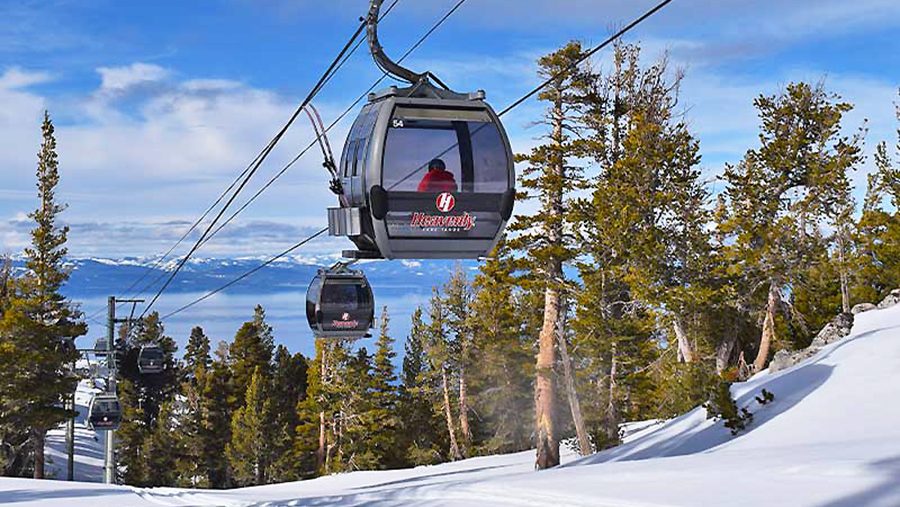Vail Resorts, Inc. saw total fiscal first-quarter net revenue decrease 7.5 percent year-over-year to $258.6 million in the three months ended October 31. The net loss attributable to Vail Resorts, Inc. was $175.5 million, or a loss of $4.60 per diluted share, for the first quarter of fiscal 2024 compared to a net loss attributable to Vail Resorts, Inc. of $137.0 million, or a loss of $3.40 per diluted share, in the prior-year corresponding quarter.
Mountain Segment
Mountain segment net revenue decreased 14.5 percent to $172.5 million for the first quarter, compared to the comparable period in the prior year, which was said to be primarily driven by the company’s Australian ski areas, which experienced weather-related challenges that impacted terrain in the current year, compared to record visitation and favorable snow conditions in the prior year.
Mountain Reported EBITDA loss was $139.5 million for the most recent quarter, which represents a decrease of $47.4 million, or 51.4 percent, as compared to Mountain Reported EBITDA loss for the year-ago comparable period, said to be primarily driven by decreases in Mountain segment net revenue, as well as increases in expenses at the company’s North American resorts, including increased labor costs and general and administrative expenses, which includes the incremental impact of prior-year investments in employee wages, increases in repairs and maintenance expense and professional services expense, including costs associated with our workforce management planning tools implementation, and the impacts of inflation.
Lodging Segment
Lodging segment net revenue, excluding payroll cost reimbursements, increased 6.0 percent to $78.4 million for the first quarter as compared to the prior-year quarter, said to be primarily driven by positive weather conditions in the Grand Teton region, which enabled increased room pricing and drove increases in owned hotel rooms revenue and ancillary product sales.
Lodging Reported EBITDA loss was $0.2 million for the three months ended October 31, which represents an increase of $4.1 million, or 94.6 percent, as compared to Lodging Reported EBITDA for the prior-year period, said to be primarily as a result of increases in Lodging segment net revenue.
Resort – Combination of Mountain and Lodging Segments
Resort net revenue was $254.3 million for the fiscal first quarter, a decrease of $25.0 million as compared to Resort net revenue of $279.3 million for the comparable period last year.
Resort Reported EBITDA loss was $139.8 million for the quarter, a decrease of $43.3 million as compared to Resort Reported EBITDA loss of $96.5 million for the prior-year period.
Commenting on Vail’s fiscal 2023 first quarter results, CEO Kirsten Lynch said, “Our first fiscal quarter historically operates at a loss, given that our North American and European mountain resorts are generally not open for ski season operations during the period. The quarter’s results are primarily driven by winter operating results from our Australian resorts and our North American resorts’ summer activities, dining, retail/rental and lodging operations, and administrative expenses.
“We are pleased with our results for the quarter, which exceeded our expectations due to the timing of expenses, primarily related to season ramp-up activities. As we expected, Resort Reported EBITDA declined compared to the prior year period primarily driven by cost inflation, including a $7 million impact of our fiscal 2023 employee investment which went into effect in October 2022, $14 million lower EBITDA from our Australian resorts due to normalized results following record demand and favorable conditions in the prior fiscal year as well as from current year weather-related challenges that impacted terrain, $4 million lower EBITDA from our North America summer operations from lower demand for summer mountain travel and weather-related challenges, and $4 million negative impact from foreign exchange rates.”
Turning to season pass results, Lynch said, “We are pleased with the results of our season pass sales, which continue to demonstrate the compelling value proposition of our pass products, our network of mountain resorts, the strong guest experience created at each mountain resort and our commitment to continually invest in the guest experience.”
Pass product sales for the North American ski season increased approximately 4 percent in units and approximately 11 percent in sales dollars through December 4, 2023 as compared to the period in the prior year through December 5, 2022. Pass product sales are adjusted to eliminate the impact of foreign currency by applying an exchange rate of 74 cents between the Canadian dollar and U.S. dollar in both periods for Whistler Blackcomb pass sales.
“We expect to have approximately 2.4 million guests committed to our 41 North American, Australian, and European resorts in advance of the season in non-refundable advance commitment products this year, which are expected to generate over $900 million of revenue and over 73 percent of all skier visits, excluding complimentary visits,” Lynch suggested.
Lynch said the results of the company’s North American pass sales demonstrate loyalty among pass holders, with strong pass sales growth from renewing pass holders and also from guests in their database who previously purchased passes but did not buy a pass in the prior season.
“Vail successfully grew units across destination, international and local geographies, with the largest unit growth in destination markets, including in the Northeast,” she continued. “The business also achieved growth in the Midwest and Mid-Atlantic, which after challenging conditions last season, highlights the stability of our advance commitment program, loyalty of our guests, and significant opportunity to drive pass penetration in the East. Pass sales grew across all major pass product segments, with the strongest product growth in regional pass products and Epic Day Pass products as lower frequency guests and local Northeast guests continue to be attracted by the strong value proposition of these products. The pass unit growth rate moderated relative to our September 2023 growth rate as we successfully moved purchasers earlier in the selling cycle, including guests who purchased our newer product offerings in the prior year period. Pass sales dollars benefited from the 8 percent price increase relative to the 2022/23 season and new pass holders coming into the program in higher priced products relative to the sales results in the prior year period, partially offset by the mix impact from the growth of regional and Epic Day Pass products.”
Outlook
Commenting on fiscal 2024 guidance, Lynch said, “Given the indicators for the upcoming season, we are reaffirming our fiscal 2024 net income attributable to Vail Resorts, Inc. guidance of $316 million to $394 million and Resort Reported EBITDA guidance of $912 million to $968 million that was included in our September earnings release based on the assumptions incorporated at that time, including foreign currency exchange rates, a continuation of the current economic environment and normal weather conditions for the 2023/24 North American and European ski season and the 2024 Australian ski season. Our fiscal 2024 guidance excludes the impact associated with Crans-Montana, which remains subject to closing. Heading into the 2023/24 North American and European ski season, we are encouraged by staffing levels on track to deliver an outstanding guest experience and the strength of our pass sales, though it is important to note that our growth in pass sales is expected to be partially offset by reduced lift ticket sales as we continue to successfully convert guests from lift tickets to pass products. In addition, there continues to be uncertainty around the economic outlook and the impact that may have on travel and consumer behavior as we head into our primary operating season.”
Photo courtesy Vail Resorts














